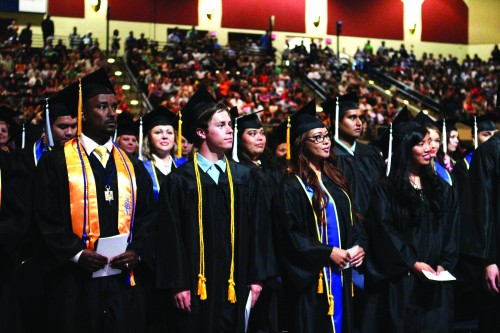San Diego community colleges may begin to offer bachelor’s degrees
CHISTINA BELLOSO
ASST. FEATURE EDITOR
Through the recently proposed California Senate Bill 850, San Diego may now allow 15 community colleges to offer specialized bachelor’s degrees to students. In accordance with the California State University and University of California systems, community colleges could start these programs beginning in 2015.
Community college students will be able to receive specialized degrees not offered at public universities in San Diego. The University of San Diego student population could be affected if some students choose to transfer or finish their degrees at a community college.
State Sen. Marty Block (D-San Diego) drew up the bill and authorized the chancellor of California community colleges to choose the schools at which to create a pilot baccalaureate program. Block believes the bill is a major step in making a degree possible for more students.
“Senate Bill 850 boosts the focus of our community colleges on job training and increasing the accessibility and affordability of our state’s higher education system,” Block said.
California would be the 22nd state to pass this bill. The degrees that would be offered would be more focused on a workforce need. According to the San Diego Union-Tribune, degrees in automotive technology, dental hygiene, health information science and radiologic technology are examples of degrees that would be given. The degrees offered at community colleges cannot duplicate what is already provided at California State University and University of California campuses.
Community colleges have typically been hubs for students planning to transfer or receive two-year associate degrees which are tailored to students going to work immediately in their field. However, many companies expect that their employees come to a job with more years of schooling than a two-year degree.
California is going through a workforce skills gap. According to Block, California will need one million more adults with four year degree educations by 2025. In this way, community colleges are being called on to fulfill this need and provide for the growing number of applicants.
Block intends for the pilot program to prepare students for their career applications.
“This is landmark legislation that is a game-changer for California’s higher education system and our workforce preparedness,” Block said.
While University of California schools are still in the process of determining whether they will go through with this bill, California State schools are supporting it. State schools believe in supplying the resources for workforce needs to be met.
San Diego community colleges do not want to change their previous mission of providing students the tools to go on to higher education functions. They simply want to expand those resources in order for people to meet stricter job entry requirements. In that way, the degrees offered will be centered on preparing students to fit the prerequisites that many jobs are now asking for.
Professor Leeva Chung attended California State schools at Fullerton and San Francisco. While there, Chung had professors that worked in conjunction with state and community colleges, teaching similar lower division courses.
She believes that the bill still needs to define how and who will instruct these community college courses.
“The key is are they going to hire Ph.D.’s to teach these classes,” Chung said. “I don’t think we’ll be affected, but I’m intrigued by how it [the bill] will be carried out and how viable these degrees will be.”
San Diego community colleges have budgeted $140,000 in order to hire more eligible faculty, add more classes, and support the program.
University of San Diego sophomore Mary Turner is hopeful about the new senate bill.
“This program could work,” Turner said. “It would just have to be very specialized. They would need to keep that community college mindset even though they would be offering four-year degrees.“
She believes there would still need to be a focus on providing an education to those unable to attend a four-year college or those wanting to transfer core class credits.
While a funding model is still being developed, SB 850 will require that students in the pilot program not be charged with fees higher than what it costs to receive a bachelor’s degree at a California State school. The cost of participation in this program is far less than the cost of a degree from a California private university.
Maria Malloy, asssociate director and international admission manager, said that the bill will not have a drastic effect on the population at USD.
“Getting core classes done at a community college and economic ability are two of the main reasons students transfer from community colleges to USD,” Malloy said.
Malloy believes that students will attend community college instead of a university if the degrees offered are in line with the job they aspire to have. Students will continue to apply to USD because of the wider range of degrees.
Students will have to make the decision of getting their degree at a community college based on the type of career path they choose to follow. A technical career like automotive technology might only require a four-year degree at a community college geared toward preparing students for that job.
Sophomore Rayan Halabi believes that there might not be a difference in where students choose to get their degrees.
“It won’t really matter where you get the degree from as long as you do receive it,” Halabi said. “What differentiates people is how able they’ll be able to pay for a school’s tuition and if they choose to pay less or pay more.”
Students will choose to attend California public and private universities if their chosen degrees go beyond what the community colleges will have to offer.
